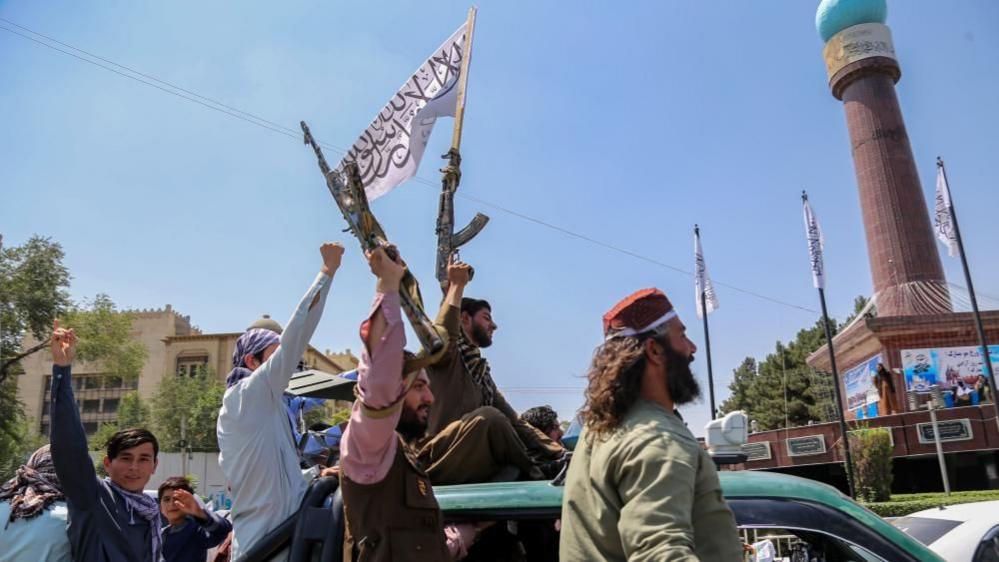Afghans express fear for relatives' safety after UK data leak

The Taliban came to power after the withdrawal of US-led Western troops in August 2021
- Published
Relatives of Afghans whose names were accidentally leaked by a UK official three years ago have told the BBC they fear retribution by the country's Taliban rulers.
Rahim - not his real name - says his father-in-law learned on Tuesday that his name was on that list - alongside those of thousands of Afghans who had applied to be relocated to the UK after the Taliban seized power in 2021.
The Taliban intensified their efforts to track his father-in-law down in 2023 and 2024, he said, adding that he was now able to understand why.
And Rahim fears it is only a matter of time before they succeed. "It's not about if - it's when the Taliban get him," he says.
The UK government says there has been little evidence of systematic killings or retribution by the Taliban since the February 2022 leak.
But others who spoke to the BBC on condition of anonymity - fearing retribution against family members - expressed shock over the leak, with one describing it as the "biggest mistake the British government has made".
Rahim, now 42 and living in the UK, knows all too well about Taliban score-settling. Two of his cousins were killed by the group in the two years before it seized power.
A couple of years later, the target of such revenge appeared to be his father-in-law, who is currently in hiding.
"We couldn't work it out, why [from 2023] there was a sudden spike in the hunt by the Taliban to capture him," Rahim says.
"We can't say for sure, but we believe they have access to that data."
Rahim says his father-in-law provided evidence of these attempts to hunt him down to the Ministry of Defence (MoD), most recently last December - his third attempt to be resettled in the UK under the Afghan Relocations and Assistance Policy (Arap).
He says his father-in-law's previous applications through the scheme were turned down because it was decided he had not worked directly with the UK government.
But Rahim says his father-in-law's latest application included "compelling evidence" that he had worked alongside British forces.
He adds that, since December 2023, his father-in-law has been hiding out in safe houses provided by a non-governmental organisation.
"Some Taliban members spent more than a decade in prison. When they came to power, they were simply looking for retribution."
But he hopes the attention given to the data leak will mean that the relocation application is expedited so his father-in-law can finally join his daughter - Rahim's wife - and him in the UK.
"The family are very concerned," Rahim says.
"Because of this data leak the risk [to my father-in-law] is more real, it's heightened, and it's imminent. It's just a matter of time."
The MoD says it will not comment on individual cases, and that a review into the data breach carried out in 2025 had concluded that there was limited evidence that certain individuals had been targeted with any degree of consistency as a result of it.
The MoD adds that the review had also found little evidence of systematic killings or retribution campaigns, and had considered the amount of time passed since the fall of Kabul and the wealth of data the Taliban otherwise have access to.
Defence Secretary John Healey also told the BBC earlier this week that it was "highly unlikely" being on the list would now increase the risk of being targeted by the Taliban.
But the data breach was called the "biggest mistake the British government has made" by one man who says he worked directly with the UK forces in Afghanistan to help them collect information on Taliban movements.
The man, who we are calling A, successfully relocated to the UK with his family but says his application to the government included details of his parents, brothers and sisters.
"I didn't know that my contacts were exposed and I only found out yesterday [Tuesday]," he tells the BBC.
"An apology alone will not remove our greatest fears because our data and our families' are now in everyone's hands - their lives are in danger.
"I called my parents in Kabul and told them to leave the city immediately and find a safe place somewhere in the province. They were also scared, they didn't know where to go... They haven't contacted me yet."
Another man - who we are calling B - says he was told the data breach included the details of his parents and two younger brothers, none of whom previously knew about the nature of his work with the British.
"Yesterday, I received an email from the MoD asking me to 'check the reference number to make sure your data has not been leaked. If it's red, it's leaked, if it's green, it's not'," he says.
"When I saw that the number was red, I couldn't sleep and I was very worried."
Though he says he is now safe, he fears for his mother and younger brothers, who he left in a northern province of Afghanistan. He adds he did not call them about the leak over concerns about their safety.
"In the past the Taliban and other people repeatedly asked my father 'where is your son', why and how [I] left the country.
"My father [was] extremely worried [and] died six months ago.
"I wish I had not told the British officials when I signed up for the job and hadn't revealed the names of my brothers. They could be in danger now.
"I didn't expect such a leak from British intelligence, we are all in shock."